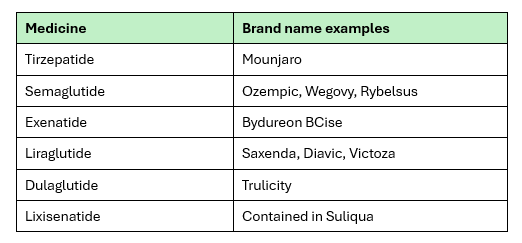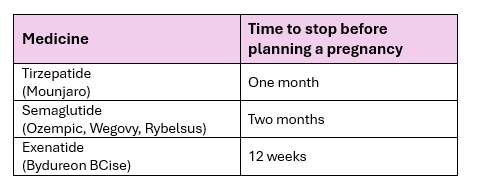What are GLP-1 agonists?
GLP-1 agonists are weight loss medicines like tirzepatide and semaglutide. They might have other brand names too such as Mounjaro, Ozempic or Wegovy.

These are used for people with type 2 diabetes or to help with losing weight. They work by making food leave the stomach more slowly and so making you feel fuller for longer.
Who is eligible for weight loss injections on the NHS?
Initially, the NHS has made Mounjaro available to patients at greatest risk of ill health, or who are experiencing severe ill health due to living with obesity. Over the next 12 years, the NHS will gradually make Mounjaro more widely available to more and more patients.
From 23rd June the first very small cohort of patients can access this treatment.
To be eligible patients must have:
- A Body Mass Index (BMI) of 40 or more AND
- Have been diagnosed with AT LEAST FOUR of the following:
- High blood pressure
- High cholesterol or abnormal blood fats
- Sleep apnoea
- Heart disease
- Type 2 diabetes
For more details on who will become eligible over the coming years, see page 7 of the official NHS Guidance.
Is Holt Medical Practice providing this service?
Holt Medical Practice (along with the many other GP Surgeries in Norfolk & Waveney) do not currently have the capacity to offer this service without it negatively impacting on our existing services. The local Integrated Care Board (ICB) has told us that it is planning to commission a community service where we will be able to refer eligible patient in to. The ICB have said this should become available later in 2025.
Where can I access local information about weight loss treatment?
The ICB have created a very useful website where local information on Mounjaro and weight loss is being constantly updated. We recommend you visit it for up-to-date information. It covers:
- What is Mounjaro?
- Who can access it through the NHS?
- Will everyone who is eligible be able to get it?
- What to do if you think you are eligible?
- What to do if you are already receiving Mounjaro privately?
- Other support for losing weight if you are not eligible
Can I pay for weight loss injections privately?
Yes, weight loss injections are available to be purchased privately in the UK. Private eligibility criteria are less stringent than on the NHS, but usually require a BMI of 30 or more. The cost of a monthly private prescription for weight loss medication ranges from approximately £130 to £300 per month. Private prescriptions can be obtained from a variety of sources. Kelling Pharmacy does offer a weight loss service for eligible patients. For more information, ask to speak to the Pharmacist.
Weight Loss Injections AND Contraception or HRT
Patient Warning: If you are using both a GLP-1 agonist (weight loss injection) and an oral contraception OR oral HRT – the effectiveness of your contraception or HRT may be compromised.
We have compiled a few key FAQs that patients should take time to read and understand.
Patients who are at all concerned about this should contact the Surgery via our online form giving details of their concerns and we will contact them with advice.
I am taking the pill. Will using a GLP-1 agonist affect my contraception?
This depends on the type of GLP-1 agonist that you are using.
If you are using tirzepatide (Mounjaro), you should use condoms along with your pill for four weeks after you start the medicine and for four weeks after any dose increase. This is because tirzepatide works a bit differently from other similar medicines. You might also think about using a different type of contraception that isn’t a pill while on tirzepatide.
For other medicines like semaglutide, exenatide, liraglutide, dulaglutide, or lixisenatide, there is no proof that they make the pill less effective.
I have diarrhoea and vomiting with my GLP-1 agonist, and I take the contraceptive pill, what should I do?
Diarrhoea and vomiting can happen when taking GLP-1 agonists and might make the pill less effective. If you vomit within three hours of taking your pill, or have bad diarrhoea for more than a day, follow the guidance for missed pills.
If diarrhoea or vomiting continues, think about using a different type of contraception that isn’t a pill, or use condoms as well.
What about non-oral methods of contraception e.g. the coil, implant, injection, patch or ring, could these be affected by GLP-1 agonists?
GLP-1 agonists do not affect contraception methods that aren’t pills. So, it’s safe to use these other options without any extra precautions when taking a GLP-1 agonist.
I need emergency contraception and I’m taking a GLP-1 agonist; will it work?
We don’t know yet if GLP-1 agonists affect emergency contraception pills. The copper IUD (coil) is the best emergency contraception and isn’t affected by diarrhoea or vomiting. If you need emergency contraception, tell your healthcare provider about all the medicines you’re taking, including GLP-1 agonists.
Can I take a GLP-1 agonist during pregnancy?
These medicines shouldn’t be used if you’re pregnant. If you get pregnant while on these medicines, talk to your doctor. You should stop taking GLP-1 agonists several weeks before trying to get pregnant. The table below shows how many weeks you should stop the medicine before planning a pregnancy for some GLP-1 agonists.

I’m on HRT and taking Mounjaro – what do I need to know?
If you are taking oral progestogen as part of your HRT (for example Utrogestan, Norethisterone, Medroxyprogesterone), then you need to be aware that tirzepatide (Mounjaro) may have an impact on the effectiveness of your HRT. This means your HRT might not protect your endometrium (womb lining) enough.
Please contact the surgery to book an HRT review, as we may need to increase your dose or change you to a different form of medication.
If you do not take your HRT orally (for example, you use a patch, a gel or a Mirena coil instead of a tablet) then you do not need to worry.
This patient information is based on a leaflet from the Faculty of Sexual and Reproductive Healthcare (FSRH) and the Primary Care Women’s Health Society.
This is for information only and should not be a substitute for seeking medical advice. Decisions regarding your contraception choices should always include discussion with a healthcare professional, particularly if you have any questions or concerns. No contraception is 100% effective and there is always a risk of pregnancy.